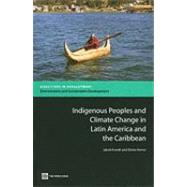
Note: Supplemental materials are not guaranteed with Rental or Used book purchases.
Purchase Benefits
Looking to rent a book? Rent Indigenous Peoples and Climate Change in Latin America and the Caribbean [ISBN: 9780821382370] for the semester, quarter, and short term or search our site for other textbooks by Kronik, Jakob; Verner, Dorte. Renting a textbook can save you up to 90% from the cost of buying.
| Foreword | p. xi |
| Acknowledgments | p. xiii |
| Abbreviations | p. xv |
| Introduction | p. 1 |
| Indigenous Peoples of LAC | p. 2 |
| Climate Change and Climatic Variability in LAC | p. 4 |
| Determinants of Vulnerability | p. 8 |
| Approach and Outline of Study | p. 11 |
| Notes | p. 12 |
| References | p. 13 |
| Indigenous Peoples of the Amazon | p. 15 |
| Threats and Perceptions of Climate Change | p. 17 |
| Effects of Climate Change on Indigenous Peoples' Livelihoods | p. 25 |
| Transforming Structures and Processes | p. 32 |
| Institutional Framework | p. 35 |
| Adaptation and Survival Strategies | p. 37 |
| Summary | p. 39 |
| Notes | p. 40 |
| References | p. 41 |
| Indigenous Peoples of the Andes | p. 45 |
| Threats from Climate Change | p. 46 |
| Andean Region-Bolivia's Northern Altiplano | p. 50 |
| Sub-Andean Region-Bolivia's Northern Yungas | p. 58 |
| Summary | p. 65 |
| Notes | p. 66 |
| References | p. 68 |
| Indigenous Peoples of the Caribbean and Central America | p. 71 |
| Abrupt Effects of Extreme Events | p. 72 |
| Effects of Slow-Onset Climate Change Processes | p. 85 |
| Indirect Social Impacts from Climate Change | p. 92 |
| Summary | p. 92 |
| Notes | p. 93 |
| References | p. 94 |
| Indigenous Peoples and Climate Change Across the Region | p. 97 |
| Threats | p. 100 |
| Impacts | p. 102 |
| Potential Effects | p. 106 |
| Adaptation | p. 107 |
| Indigenous Peoples, Mitigation of Climate Change, and Protection of Biodiversity | p. 110 |
| Notes | p. 116 |
| References | p. 117 |
| Conclusions and Recommendations | p. 123 |
| Indigenous Peoples of Latin America and the Caribbean | p. 124 |
| Culture, Livelihood, Institutions, and Knowledge | p. 125 |
| Impact of Climate Change on Indigenous Peoples | p. 127 |
| Climate-Change Adaptation in an Indigenous Context | p. 129 |
| Climate-Change Mitigation in an Indigenous Context | p. 130 |
| Operational Recommendations | p. 131 |
| Needs for Further Research | p. 133 |
| Notes | p. 134 |
| References | p. 135 |
| Climate Change and Climatic Variability in Latin America and the Caribbean | p. 137 |
| Images of Present Change | p. 138 |
| Images of the Future | p. 144 |
| Aspects of Observed Climate | p. 146 |
| Global Climate Change Issues | p. 150 |
| Projections of Regional Climate Change | p. 153 |
| Further Research | p. 164 |
| Notes | p. 165 |
| References | p. 166 |
| Field Work Methodology | p. 171 |
| Notes | p. 173 |
| Reference | p. 173 |
| Index | p. 175 |
| Boxes | |
| Projected Climate Change and Climatic Variability in LAC | p. 6 |
| The Annual Ecological Calendar (as It Should Be) | p. 20 |
| The Effects of Seasonal Change on the Giant Turtle, an Endangered Species | p. 26 |
| Glacial Retreat Gravely Affects Highland Herders | p. 48 |
| Quechua-S peaking Populations and Water Resources in the Cordillera | p. 53 |
| Competition and Conflict over Water Resources | p. 58 |
| Some Testimonies | p. 63 |
| Indigenous Peoples in Mexico and Nicaragua | p. 73 |
| Edited Testimony of April 2008 by Oswaldo Morales, Garifuna, Member of the National Commission for Territorial Demarcation of Indigenous Land, Laguna de Perlas, Nicaragua | p. 81 |
| Indigenous Peoples and Migration Related to Climate Change | p. 127 |
| Climate Definitions | p. 140 |
| Table of Contents provided by Ingram. All Rights Reserved. |
The New copy of this book will include any supplemental materials advertised. Please check the title of the book to determine if it should include any access cards, study guides, lab manuals, CDs, etc.
The Used, Rental and eBook copies of this book are not guaranteed to include any supplemental materials. Typically, only the book itself is included. This is true even if the title states it includes any access cards, study guides, lab manuals, CDs, etc.